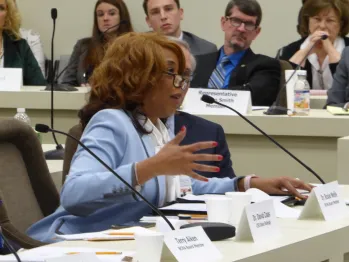As the North Carolina General Assembly plans to return to Raleigh Tuesday, The N.C. Healthcare Association has indicated a potential break in the standoff over certificate-of-need reform. Disagreements involving CON have helped block a deal for Medicaid expansion.
For years the hospital group has advocated expanding the Medicaid entitlement program to an additional 700,000 people, while also fighting expanded access to health care linked to reforming CON regulations on providers. Now, in a rare instance of Gov. Roy Cooper and Republican lawmakers on the same side, the pressure stepped up on the NCHA, whose opposition to CON reform has been a primary stumbling block in reaching a Medicaid deal.
CON laws allow the state’s Department of Health and Human Services to prohibit health care providers from “acquiring, replacing, or adding to their facilities and equipment,” Critics call it a government “permission slip” that prevents market competition. The NCHA objected to lawmakers enacting Medicaid expansion, if the legislation included CON reforms in the Senate’s version of the bill.
“I do not see the Senate passing Medicaid expansion unless there is a significant change in North Carolina’s CON laws,” Senate leader Phil Berger, R-Rockingham, told reporters, saying CON modification can help with the lack of timely and available appointments for Medicaid patients, and address the issue of hospital mergers. If markets are allowed to provide facilities by easing CON laws, he thinks a deal could be reached quickly.
“Putting more competition into the availability of facilities,” he said. “I have felt for a long time that the [Federal Trade Commission] ought to be looking at how things operate in North Carolina with reference to providing health care, particularly in hospitals.”
The NCHA now is extending a proposal to lawmakers, saying they could agree to modifications of CON laws in ambulatory surgery centers, something the group estimates would cost hospitals $700 million in annual revenue. The proposal also indicates that they would support lawmakers repealing CON laws for psychiatric inpatient beds and chemical dependency beds.

Credit: Rose Hoban, northcarolinahealthnews.rog
“In an effort to get stalled negotiations moving, and in response to Senator Berger’s and Governor Cooper’s requirement that Medicaid expansion be coupled with certificate of need reform, our board of trustees has made the difficult decision to propose certificate of need law reforms,” said NCHA Board Chair Dr. Roxie Wells, president of Cape Fear Valley Health Hoke Hospital in a press release on Friday. “CON law changes could threaten the survival of community hospitals if they are not implemented carefully. We are putting a lot of trust in legislative leaders to do this correctly. If this policy damages access to local healthcare services, we hope that government leaders will find the resources to preserve crucial healthcare services and facilities, including safety-net services that North Carolinians rely on.”
As a condition of its cooperation, NCHA proposes that the General Assembly pass expansion legislation that includes participating in the Healthcare Access and Stabilization Program or HASP. It is a federal program that allows hospitals to pull down federal taxpayer dollars in Medicaid reimbursement at rates closer to what commercial health insurers are paying. The program also covers increasing reimbursement rates for rural hospitals at about 90% of their unreimbursed cost. The association’s proposal holds any reforms to the CON law until after the state implements Medicaid expansion and hospitals start getting HASP funds.
NCHA reports that currently hospitals receive 72 cents for every dollar spent on providing care to Medicaid and uninsured patients, amounting to a $2.3 billion reimbursement gap every year.
NCHA is a powerful lobby in state government, but Cooper and Republican lawmakers being on the same side of this issue put pressure on the hospital group over the last few months to help them strike a deal. The offices of Berger and N.C. House Speaker Tim Moore say they are reviewing the proposal, but did not comment on its viability.
There are no votes expected this week as the legislature gavels in, but Cooper and his Health and Human Services Secretary Kody Kinsley have publicly called for lawmakers to pass a bill in September and not wait until December’s legislative session.